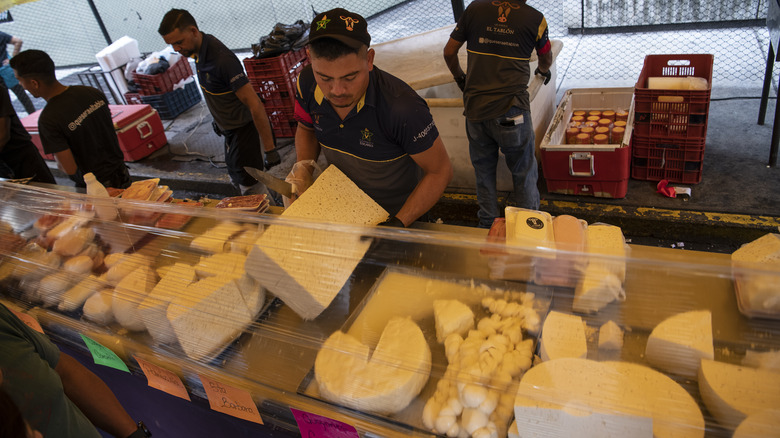The Type Of Cheese That Has More Protein Than Cooked Meat And Fish
Protein is an essential part of a balanced diet. And while many of us know how important it is, you might be bored with the usual options and looking for new and exciting ways to add protein to your life. Maybe you've decided to go vegetarian and want to ensure you hit all your necessary protein milestones. Getting protein from cheese is certainly a viable option. Several varieties can provide you with as much (or more) protein per ounce as fish or meat.
When you're thinking about changing up your diet, it is essential to make sure that you are meeting your protein needs. Proteins are complex molecules within the body that are used for the structure and regulation of body tissues and organs, according to Medline Plus. These proteins provide a range of duties, like protecting the body from invaders, enabling chemical reactions, and carrying messages to cells. Not getting enough protein can hinder muscle building and make your body feel out of sorts.
You can go into your new diet with assurance by exploring a few cheeses that have more protein than meat and fish. Discover a few additional benefits of adding more cheese to your life.
Pressed cheese is packed with protein
When you peruse the cheese aisle of your local grocery store, you might not think too much about the different kinds of cheese. You grab your favorite package of shredded cheddar and hit the checkout lane. But before heading out the door, consider adding pressed cheeses like parmesan to your cart to round out your protein needs.
Pressed cheeses have been put under pressure, so the whey is removed, making a hard block of cheese. You might also hear these cheeses referenced as hard cheeses, according to Edible Milwaukee. These cheeses include cheddar, pepperjack, parmesan, and emmental varieties of cheese. They can actually have more protein than fish or meat per ounce. For example, Johns Hopkins Medicine notes that one ounce of meat has seven grams of protein, the same amount per ounce as cheddar. But if you're looking for a protein fix, the U.S. Department of Agriculture (USDA) stated that parmesan has 8.05 grams of protein per ounce. Emmental comes in a close second with eight grams of protein per ounce, noted the USDA.
You can quickly bulk up the amount of protein on your plate by making cheese the main course or sprinkling parmesan onto your salad. But it's important to remember to consume cheese in moderation since they are high in fat. You can also opt for the low-fat cheese varieties. However, some of these could actually be unhealthy due to fillers and other additives.
Soft cheeses can give a substantial protein bump
While pressed cheeses are the cat's meow when it comes to protein, you can't discount the soft cheeses like feta, ricotta, cream cheese, and cottage cheese. Rather than being aged and molded into a block, Wisconsin Cheese notes that these are typically your fresh and creamy cheeses that are easy to spread and gobble up with a fork.
Given their gooey nature, soft cheeses are typically measured by the cup rather than the ounce. But it's not hard to add a half cup of ricotta to your lasagna for an added 9.35 grams of protein, according to the USDA. You might also want to add a side of cottage cheese to your meal for a protein boost. Healthline stated that a half cup of cottage cheese offered 14 grams of protein. Given its low-calorie density, it can be helpful in weight loss and muscle gain. Additionally, a 2017 study in the Journal of the International Society of Sports Nutrition showed that consuming casein, which is abundant in cottage cheese, before bed increases muscle protein synthesis.
Getting rid of meat and fish in your life doesn't mean you need to lose out on protein. Several cheeses are packed with high protein values to help you meet — and even exceed — your daily requirements. They can also be easily added to salads and meals for a little protein bump.



